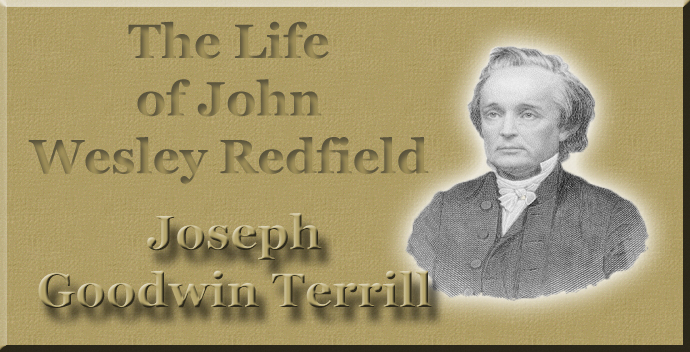
The Life Of John Wesley Redfield
By Joseph Goodwin Terrill
Chapter 9
|
Mr. Redfield soon returned to his bachelor's hall again. It must have been a curiosity shop indeed. Shelves covered the walls on all sides. These shelves were loaded with geological specimens, freaks of nature in wood and stone, Indian relics and mechanism of his own invention. Two mice, bound with delicate chains of his own manufacture, which fed and sported and slept at their pleasure, were his only companions. Here he secluded himself from the world and Christian friends lest some of them should mention the subject of preaching the gospel. Neither he nor they could let the subject alone. His presence impressed them with the subject, and his sore heart kept it upon his own mind whether sleeping or waking. One day he met the Methodist preacher in the street, who began immediately to urge him to consent to go to work in the vineyard of the Lord. He tried to avoid it by arguing both himself and the minister to another conclusion. He had held an exhorter's license for some time, which had been crowded upon him against his will, but he had never used it. The minister now asked that he might present his case to the leader's meeting for a recommendation for a license to preach. A strong and abiding impression seized him that unless he consented he would be killed by lightning. It seemed to him utter foolishness to allow himself to be swayed by any such thing; especially in a matter of such moment. His past experiences of a similar nature helped this impression to take the firmer hold upon him. It haunted him day and night for a long time. When the terrible thunder storms which frequently passed over would arise, and especially in the night, all his peace and rest and sleep would be at an end until the storm ceased . He would resort to all the precautionary measures that his knowledge of the laws of electricity would suggest to him, as opening the windows and giving a free circulation of air through the room, setting a chair in glass tumblers and sitting in it with the feet upon the rounds, and then pray and tremble until the storm was over. The familiar acquaintances of the man can fully appreciate this. This state of mind lasted for some weeks, when one night his fears became so great that he promised most fervently, that if God would relieve him, he would present his case himself to the leaders' meeting on the first opportunity to do so. In an instant, when the storm was at its highest, his request was granted, and he went to rest and sleep, as calmly as ever in his life. The Friday evening after, the leaders were to meet, and he went to redeem his pledge. The meeting was held in the basement of the church. When a suitable opportunity came, he arose and stated his feelings. He was about to retire as usual in such cases, when he was stopped by one of the members and asked how he stood on the question of abolitionism. This question was then greatly agitating the Methodist Episcopal Church. He answered, "I am an abolitionist of the strongest type." "Then I shall oppose the recommendation." said the brother. He earnestly hoped they would not grant the recommendation, for that, he thought, would release him; and to make it doubly sure, he now said, " I wish it distinctly under stood that if I am granted a license to preach, and that shall add anything to the influence I now possess, I shall certainly use it for God and the slave. So now your eyes are open and you know what I am and what to expect." Again it was remarked, "We shall contest the matter." He retired, and immediately the vote was taken, and the recommendation was granted. The meeting adjourned, and before they had hardly reached their homes the church was struck with lightning. This made a profound impression upon him, and when soon after, the quarterly conference convened, he was ready to be examined according to discipline. The license was granted, but when it was handed to him, he felt he could not use it. He was in constant dread of his wife's returning, for he believed he could do nothing with her. He was also in constant fear that the tongue of slander would break out upon him in regard to his family matters, and that the more certainly if he began to preach. He used the license for a few times, and was urged to go upon a circuit as a supply. He consented to this for a short time, and though pressed to continue, he refused. He also refused to accept of any compensation for his services. He not only shrank from the responsibilities of the sacred office, but also from the very name of a Christian minister, and pay for his services implied that. He finally gave up preaching altogether, and went to Cleveland, Ohio, for the winter.
|
|
 |
 |
|
|
|
-
Site Navigation
 Home
Home What's New
What's New Bible
Bible Photos
Photos Hiking
Hiking E-Books
E-Books Genealogy
Genealogy Profile
Free Plug-ins You May Need
Profile
Free Plug-ins You May Need
 Get Java
Get Java.png) Get Flash
Get Flash Get 7-Zip
Get 7-Zip Get Acrobat Reader
Get Acrobat Reader Get TheWORD
Get TheWORD